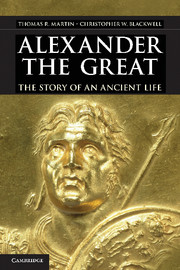Book contents
- Frontmatter
- Contents
- Acknowledgments
- Introduction: The Goal of this Book
- Map 1: European Greece, Macedonia, and Northern Lands
- Map 2: Alexander's Expedition
- 1 The World of Alexander's Birth and His Education in Literature and Warfare (350s and 340s BC)
- 2 Opportunities and Risks asa Teenager (340s to 338 BC)
- 3 The Danger in Replacing a Murdered Father as King (337 to 335 BC)
- 4 The Opening Battles Against the Persian Army (334 to 332 BC)
- 5 Finding God in Egypt and Capturing the Riches of Persia (332 to 330 BC)
- 6 Winning the World as King of Asia (330 to 329 BC)
- 7 Murder, Marriage, and Mixing Customs in Afghanistan (329 to 327 BC)
- 8 Victory and Frustration in India (327 to 326 BC)
- 9 Returning to Babylon and Becoming Divine (326 to 323 BC)
- 10 Remembering and Judging Alexander (323 BC to Now)
- Suggested Readings
- Index
4 - The Opening Battles Against the Persian Army (334 to 332 BC)
Published online by Cambridge University Press: 05 November 2012
- Frontmatter
- Contents
- Acknowledgments
- Introduction: The Goal of this Book
- Map 1: European Greece, Macedonia, and Northern Lands
- Map 2: Alexander's Expedition
- 1 The World of Alexander's Birth and His Education in Literature and Warfare (350s and 340s BC)
- 2 Opportunities and Risks asa Teenager (340s to 338 BC)
- 3 The Danger in Replacing a Murdered Father as King (337 to 335 BC)
- 4 The Opening Battles Against the Persian Army (334 to 332 BC)
- 5 Finding God in Egypt and Capturing the Riches of Persia (332 to 330 BC)
- 6 Winning the World as King of Asia (330 to 329 BC)
- 7 Murder, Marriage, and Mixing Customs in Afghanistan (329 to 327 BC)
- 8 Victory and Frustration in India (327 to 326 BC)
- 9 Returning to Babylon and Becoming Divine (326 to 323 BC)
- 10 Remembering and Judging Alexander (323 BC to Now)
- Suggested Readings
- Index
Summary
Alexander commanded a large army by Macedonian and Greek standards. As he started his expedition in 334 he had 10,000 men in his advance force already in Asia, 32,000 infantry (heavily armed phalanx-men and lightly armed, maneuverable skirmishers), and 5,000 cavalry. “The Greeks” provided significant contingents of men, and Alexander's expeditionary force probably comprised about 40 percent Macedonians, 40 percent Greeks, and 20 percent other Balkan peoples. To keep his homeland secure, Alexander left a garrison of 12,000 infantry and 1,500 cavalry under Antipater, an experienced commander of Philip's generation. Antipater was reliable. During the traditional wine-soaked dinner parties that were the mainstay of social life in Macedonia, Philip used to say, “Oh, now we really have to drink; Antipater is here to stay sober.”
But compared to his enemy's forces, Alexander's army was puny. Over the 200 years of its history the Persian Empire had grown vast. Its heartland, the home of the ethnic Persians, was Iran, but its provinces extended to what is now Turkey in the west, to Afghanistan and the Indus River Valley in India and Pakistan in the east, to the steppes of the Central Asian republics in the north, and to Egypt in the south. At least thirty different peoples were subjects of Persia, administered locally by regional governors called “satraps.” The imperial territory of Persia was fifty times larger than mainland Greece and Macedonia combined; its population was twenty-five times more numerous. The Great King held supreme power, ruling from great palaces in several capital cities. His subjects’ duties were to pay taxes, send soldiers to his army, and remain loyal. The Macedonians were beggars compared to the Persian king. His treasuries contained mounds of gold and silver, ready to be struck into coins at royal command. His army boasted 100,000 infantry from the many peoples of the empire, but his pride was the cavalry, 20,000 strong at full muster. The Persian navy was lavishly funded and large, with the best ships and sailors furnished by the Phoenicians, a people with centuries of experience on the sea. The Great King also employed tens of thousands of Greek mercenaries as heavy infantry – the superiority of Greeks at fighting on foot was universally recognized. An army must be able to move, and toward this end, the Persian Empire was crisscrossed with an elaborate system of roads linking the major centers. Nevertheless, the distances were vast and the terrain often rough. The empire's extent, the large ethnic diversity of the huge army, and the babble of different languages of its troops created perpetual challenges of logistics and command.
- Type
- Chapter
- Information
- Alexander the GreatThe Story of an Ancient Life, pp. 53 - 72Publisher: Cambridge University PressPrint publication year: 2012



